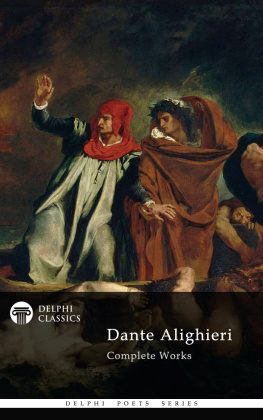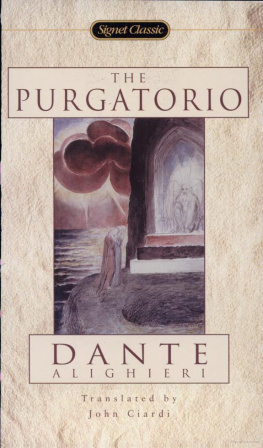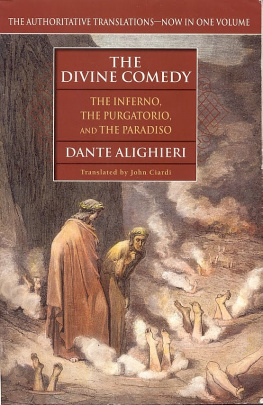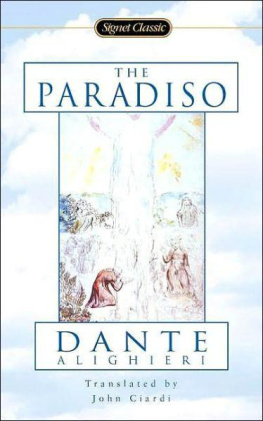THE DIVINE COMEDY OF DANTE ALIGHIERI
THE DIVINE COMEDY OF DANTE ALIGHIERI
Edited and Translated by
ROBERT M. DURLING
Introduction and Notes by
RONALD L. MARTINEZ
AND ROBERT M. DURLING
Illustrations by
ROBERT TURNER
Volume 2
PURGATORIO


Oxford New York
Auckland Bangkok Buenos Aires Cape Town Chennai
Dar es Salaam Delhi Hong Kong Istanbul Karachi Kolkata
Kuala Lumpur Madrid Melbourne Mexico City Mumbai Nairobi
So Paulo Shanghai Taipei Tokyo Toronto
Translations copyright 2003 by Robert M. Durling
Introduction and Notes copyright 2003 by Ronald L. Martinez and Robert M. Durling
Illustrations copyright 2003 by Robert Turner
First published by Oxford University Press, Inc., 2003
First issued as an Oxford University Press paperback, 2004
198 Madison Avenue, New York, New York 10016
www.oup.com
Oxford is a registered trademark of Oxford University Press
All rights reserved. No part of this publication may be reproduced,
stored in a retrieval system, or transmitted, in any form or by any means,
electronic, mechanical, photocopying, recording, or otherwise,
without the prior permission of Oxford University Press.
Library of Congress Cataloging-in-Publication Data is available
ISBN-13 978-0-19-508741-3; 978-0-19-508745-1 (pbk.)
ISBN 0-19-508741-0; 0-19-508745-3 (pbk.)
3 5 7 9 10 8 6 4 2
Printed in the United States of America
on acid-free paper
PREFACE
Since the submission of our Inferno for publication (1994) there has been an important renewal of discussion of the text of the Comedy in Lanzas (1995, 1997) and Sanguinetis (2001) critical editions: the first privileges the earliest Florentine manuscript, the Trivulziano (Milan, Trivulziano 1080), against Petrocchis view of the northern tradition as superior, and the second argues for the unique authority of the Vaticans Urb. Lat. 366 (Urb.), from Urbino, on the basis of a collation of Barbis famous 400 loci critici in the 600 existing manuscripts (at the time of this writing, the volume giving Sanguinetis detailed justification of his readings had not yet appeared). Both Lanza and Sanguineti adopt many readings rejected, rightly or wrongly, by the mainstream of modern editing.
The text presented here is a compromise; not persuaded of the exclusive authority of any manuscript (indeed, unwilling to exclude altogether the possible existence of authors variants), the editor has felt free to adopt readings from various branches of the stemma. Thus the text of our Purgatorio once again, in the main, follows Petrocchis La Commedia secondo lantica vulgata (1994), but the editor has departed from Petrocchis readings in a number of cases, somewhat larger than in the previous volume, not without consideration of Lanzas and Sanguinetis readings (these departures are discussed under the rubric Textual Variants, pages 627-29), and, as before, Petrocchis punctuation has been lightened and American norms have been followed. The translation follows the same principles as that of the Inferno and has the same format, and the reader is referred to the Preface of that volume for discussion of its aims and those of the notes. As before, the numbers in the margins are those of the first Italian line of each terzina, and in the notes numbers always refer to the Italian text; Vergil refers to the historical person, Virgil to Dantes character.
One innovation in our notes to this volume is a section for each canto that we have dubbed Inter cantica, discussing the relation of the canto with the Inferno (we hope to include similar sections in our Paradiso volume). These Inter cantica are not exclusively discussions of the cantos relation to the similarly numbered canto in the Inferno, although that subject clearly deserves more attention than it has heretofore received; we have learned much from writing these notes: the self-referentiality of the Comedy is complex indeed.
Acknowledgments
We have again received generous help and encouragement from many friends and colleagues, and it is a pleasure to express our gratitude to them. In particular, Warren Ginsberg, Regina Psaki, and John A. Scott have commented in detail on extensive portions of the manuscript, Paul Alpers, the late Charles T. Davis, and Nicholas J. Perella on the entirety of an earlier state of the translation. Nancy Vine Durling has caught many errors, typographical and otherwise, in our drafts, David L. Jones in the first printing. Pre E.-H. Wber, O.P., has given us kindly and helpful advice, reminding us that the interpretation of Aquinas, Albert, and other thirteenth-century thinkers remains subject to lively debate. Our debt to Albert R. Ascoli is once again profound, and our expression of gratitude to him in our first volume may be taken as applying to this one as well. Charles Lee, of McTek Enterprises, Berkeley, has given us invaluable help and computer first-aid. The staffs of the Bibliothque Nationale de France (Sites Franois-Mitterrand and Richelieu), the Bibliothque du Saulchoir (Paris), and the Doe and Bancroft Libraries at the University of California, Berkeley, have been unfailingly cordial and helpful. And once again the patience, forbearance, and active helpfulness of our wives, Nancy Vine Durling and Mary Therese Royal de Martinez, have been exemplary.
We again owe a great debt to the personnel at Oxford University Press, especially to Ruth Mannes, in charge of production of the volume.
The text of the Purgatorio is reprinted (with qualifications, as above) from La Commedia secondo lantica vulgata, edited by Giorgio Petrocchi (sponsored by the Societ Dantesca Italiana; copyright 1994, Casa Editrice Le Lettere), with the kind permission of both sponsor and publisher.
As before, translations of biblical passages are from the Douay version of the Latin Vulgate, except as noted, and, unless otherwise identified, nonbiblical translations are our own.
We record a deep sense of loss at the passing in 1998 of the great Dante scholar Charles T. Davis, a dear friend whose acute and kindly criticism and encouragement had long been of vital importance to us, as to many others. We dedicate this volume to his memory.
Berkeley
Providence
August 2002
R.M.D.
R.L.M.
MAPS
FIGURES
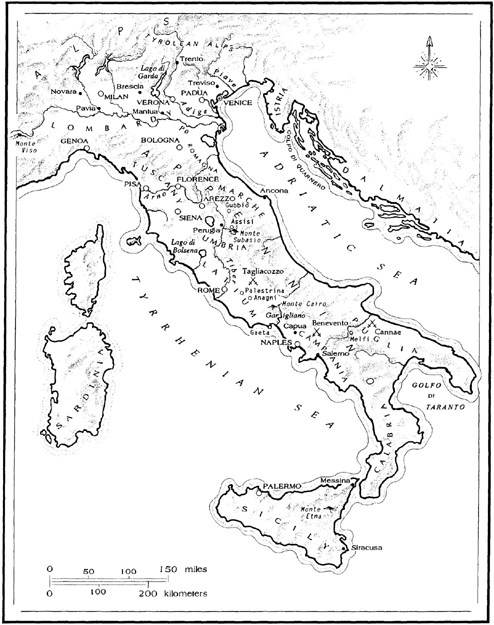
Italy, ca. 1300

Romagna and Tuscany, ca. 1300
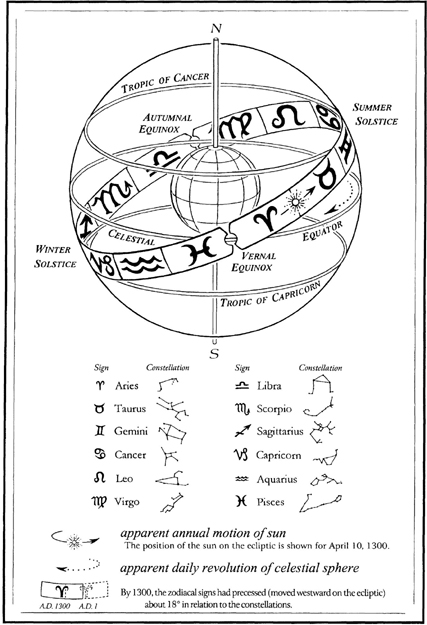
The Celestial Sphere and the Zodiac
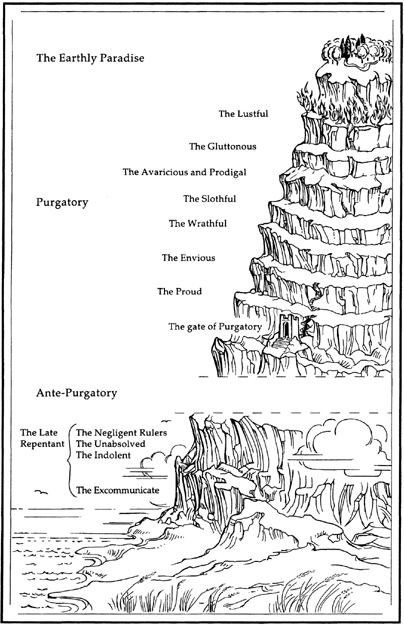
The Structure of Dantes Purgatory
ABBREVIATIONS
|
Achill. | Statius, Achilleid |
Next page

